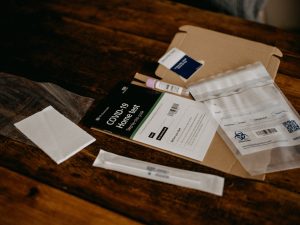How Can We Help?
Update: Are There Home Tests for Coronavirus?

The Food and Drug Administration (FDA) has recently given the green light to four COVID-19 rapid tests that deliver results in real time at home, including two that will be sold over the counter without a doctor’s prescription.
Until now, most kits had to be mailed back to labs and the costs were close to $100 or more. The new at-home coronavirus tests are less expensive, and deliver results on the spot. Even though vaccination has started, public health experts say at-home tests are an important tool for helping slow the virus over the next few months until most Americans have the opportunity to get the vaccine.
This article answers some of the common questions about the new at-home tests.
What are the different types of at-home tests?
So far, the FDA has given what’s called emergency use authorization (EUA) to four at-home tests. The tests are:
- The Ellume COVID-19 Home Test: This was the first at-home test to be authorized that can be done without a prescription. It uses so-called antigen technology, meaning it looks for fragments of viral proteins. The company is close to announcing a deal with retailers to distribute the test, a spokeswoman said, and it will also be sold online. It will cost about $30. The test delivers your results wirelessly to a smartphone app in 15 to 20 minutes.
- Cue COVID-19 Test for Home and Over the Counter Use: This test is also authorized to be sold over the counter without a prescription. It uses molecular technology, which can pick up very small amounts of genetic material. Molecular tests are generally more accurate than those that use antigen technology, especially in patients who are asymptomatic. Results are available in about 20 minutes. Cue Health cofounder said the company is working to make the test available at retailers nationwide, but he did not have a time frame. The company has yet to set a price for the test.
- Abbott’s BinaxNOW COVID-19 Ag Card Home Test: You will order this test through a digital health platform called eMed after answering screening questions. Once you get the test, a certified guide will walk you through collecting your sample via video call. Distribution began in January to “select states and employers,” an eMed spokesman said. Sign up on the company’s site to find out when the test is available in your area. The test costs $25, plus overnight shipping. Results are available in about 15 minutes.
- Lucira COVID-19 All-In-One Test Kit: Like the Cue test, the Lucira uses molecular technology. It is priced at $50, and you need a prescription to use it. Lucira is selling the test directly to health care providers; a spokesman says your doctor can order it for you. It takes about 30 minutes to deliver results.
How accurate are the tests?
Data submitted to the FDA for all four tests show high accuracy rates – above 90 percent — but testing experts noted that their effectiveness in the real world will likely be lower due to user error and other factors.
The Ellume and the BinaxNOW tests use the same antigen technology as many of the rapid tests given by health care providers. Antigen tests are less accurate than the gold standard method used by labs called polymerase chain reaction, or PCR.
Studies show antigen tests miss many asymptomatic infections. They work best when you’re having COVID-19 symptoms. The Cue and Lucira tests use a newer molecular technology called isothermal amplification that is similar to PCR. Like PCR, it works by copying the virus’s genetic material until there are detectable levels.
David Pride, M.D., director of the clinical molecular microbiology laboratory at the University of California, San Diego, says that while molecular tests are generally more accurate than antigen tests because they can detect the virus at lower levels, they are still less sensitive and less specific than a PCR test done in a lab.
For any at-home test, if you have symptoms and you test positive, “it’s very, very likely you have the virus,” Pride said, and you should go into isolation and get in touch with your health care provider.
How confident can you be of a negative result?
A negative test can give you more confidence about going into work or visiting a family member, but experts emphasized that it’s not a free pass to stop wearing a mask, practicing social distancing or taking other precautions.
A study published by the CDC on Jan. 22 found that Abbott’s antigen test identified only 34 percent of COVID-19 infections in people without symptoms.
If you test negative but have symptoms, reach out to your health care provider, because there’s a high risk it’s a false negative, Procop said. Your doctor may order a PCR test to confirm your result.
The authorized at-home tests all require you to collect a sample by swabbing your nostrils, either just inside or a little deeper, depending on the test. The good news: You don’t have to insert a swab into the deepest part of your nose like some of the tests performed by health care providers.
If your symptoms are severe or if you are in a group at high risk of complications from COVID-19, you should consider getting a PCR test.
The arrival of the at home tests are great as we move forward with opening up our circles and communities in the coming months.
Prerana Sangani, MD, March 17, 2021


